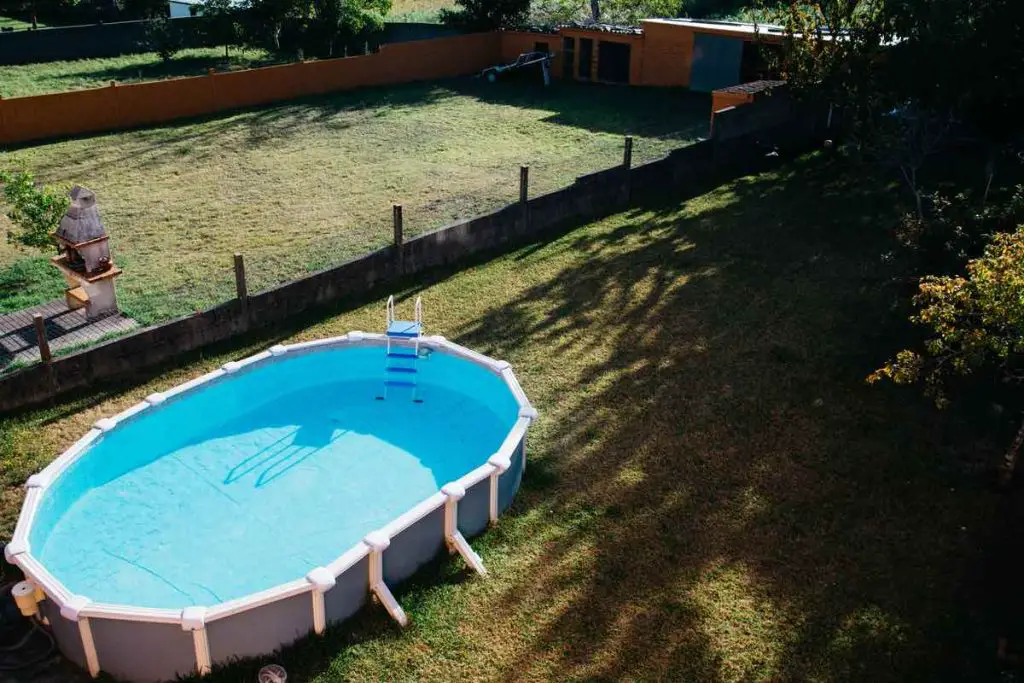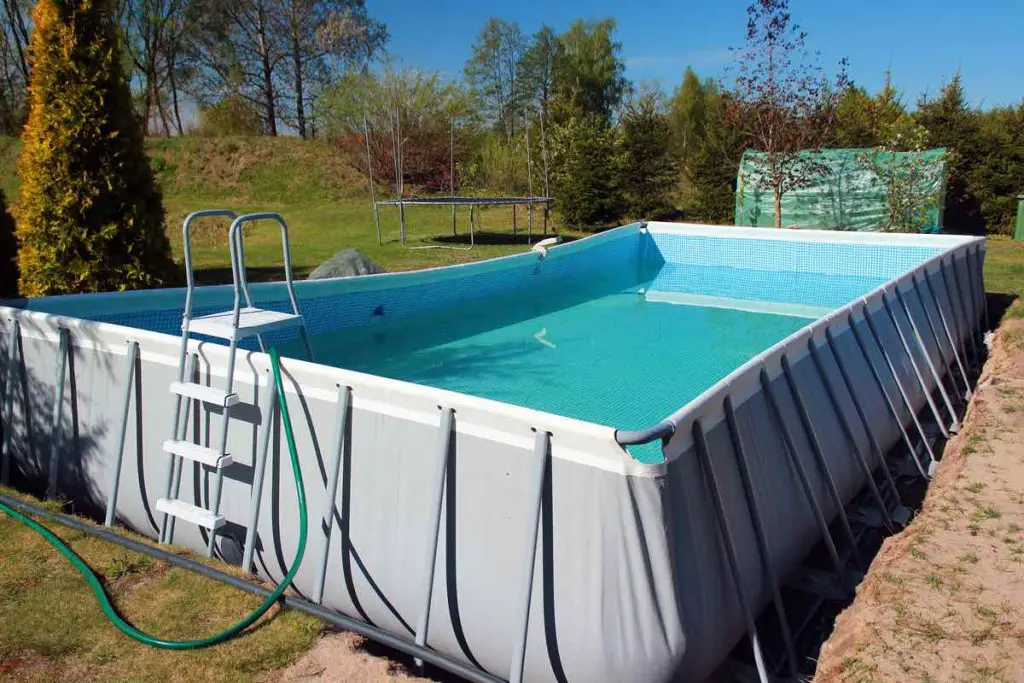Above-ground pools are a great alternative to having an inground pool in your space. They can offer just as much relief from the summer heat (and great memories with family and friends) as their in-ground alternatives. The main concern for buyers is the sturdiness of above-ground pools.
Above-ground pools don’t collapse often. A typical above-ground pool has a lifespan between 10 and 20 years, given the proper maintenance. While they are more likely to collapse in comparison to in-ground pools, above-ground pools are most likely to fail as a result of harsh winter conditions.
Below I’ll explain the common reasons that above-ground pools collapse. Please continue reading to see what they are and how to prevent them.

Reasons for Collapse
There are a few reasons that above-ground pools collapse, most of which are related to maintenance and care. These are the top six reasons for a collapse:
- Weight of rain or snow
- Improper installation
- Age
- Overfilling
- Low-quality materials
- Frame corrosion
Let’s take a closer look at these reasons below.
Weight of Rain or Snow
It goes without saying that water can weigh a lot. If a large amount of rain falls on your pool cover, it can add to the pressure inside the pool, causing it to collapse. In the same light, if that rain freezes or if snow accumulates on the pool cover, the resulting weight is even more.
Improper Installation
Improper installation typically means one of three things:
- The clamps and parts of the frame were not put together correctly, weakening it.
- The liner was not installed correctly and had wrinkles. This allows it to slip around the frame, causing weakness, spillage, or splitting.
- The pool was installed on uneven ground. This allows the pressure from the water and movement in the pool to push on the sides unevenly, causing weak spots.
It is always a good idea to have a professional install your pool. They are used to seeing and fixing issues ahead of time to prevent later problems. They can provide essential guidance on necessary parts and the site you wish to place your pool on.
Age
The age of your pool goes hand in hand with the issue above. Everything loses structural integrity as it ages. Fortunately, if you keep up the maintenance on the pool, it can last for many, many years.
Generally speaking, any pool over ten years old is going to need possible painting repair, liner repair, and possibly a new pump.
Overfilling
Overfilling your pool is similar to the rain/snow issue discussed above. If you overfill a pool, more pressure is applied to the sides of the pool. This excessive pressure can cause the sides to split and leak or collapse altogether.
Be sure to follow the advice of professionals when it comes to filling your above-ground pool—for the sake of the pool and anyone that may use it.
Low-Quality Materials
Low-quality materials can cause frames to start out weaker and liners to be thinner in places. These conditions can compromise the pool’s structural integrity from the get-go and lead to collapse early on. Keep this in mind when shopping for an above-ground pool for your home.
Frame Corrosion
Pools over ten years old generally experience the issue of frame corrosion. However, that doesn’t mean it can’t happen sooner. If you notice rust on your frame, it is best to fix it immediately. If you fail to address the corrosion, it can worsen, causing the frame to become weaker and weaker.
Choose a Reliable Frame for Your Above-Ground Pool
There are several types of frames you can use for your pool. Each one is different in pricing and strength. Read below to find out more.
- Steel Frame. This is the traditional style of pool frame and is usually made from aluminum or galvanized steel. These tend to be the least expensive but also the weakest. They are not made to be up year-round, so you will have to disassemble them before the winter months.
- Resin. These are higher-end frames that tend to last longer. They are made from hard plastic and are more resistant to rust, warping, and denting. Resin frames often cost more, but the added price is worth it in the long run.
- Hybrid Frame. These frames are a combination of steel and resin. These sturdy materials allow some of the durability of resin, along with the lower price and strength of steel frames.
Preventing Damage to Your Above-Ground Pool
You can do several things to protect your above-ground pool from damage. Following these things below can save you time, money, and headache.
- Routine Maintenance. The number one way to prevent damage to your pool is through regular routine maintenance. Keeping a check on your frame for any rusted spots and correcting them early on is essential. Don’t forget to check your liner for cracks or tears and ensure your filter is working correctly.
- Winterizing. During the winter months or off-season, be sure to close down your pool properly. This includes adding chemicals to prevent freezing or algae growth. Placing a proper pool cover on and closing off the pump for the season will also be needed. You may need to purchase skimmer covers or check to make sure the water line is below the skimmers. Placing a winter cap over your return jet is helpful too.
- Covering. A strong pool cover and ensuring it is adequately attached can help prevent rainwater and melting snow from causing it to sag or crack. Removing the ice and snow regularly as it falls will help prevent the cover from getting excessively heavy.
Things to Consider When Deciding On a Frame
You would want to consider a few things when deciding which frame you would need for your above-ground pool.
- Size. You’ll want to determine the size of your yard first and if there are any HOA rules to follow.
- Shape. Oval pools may appear bigger, but they tend to hold the same amount of water as round pools. Round pools also need fewer parts for the frame for installation.
- Liner. There are several options available for liners. The general differences are thickness and how they attach to the frame.
- Pump and filter. These are necessary to keep your pool clean and free of debris. There are several options for these as well. They can use different components for cleaning and use various amounts of energy.

Conclusion
Above-ground pools can make for an exciting addition to your summer festivities. Upkeep with them is a must, although the necessary maintenance is generally less intensive than that of an inground pool.
Regular maintenance is key to preventing the collapse of your above-ground pool. Fixing rust issues and not overfilling also help prevent further issues. Using high-quality materials when installing the pool can help avoid an abundance of maintenance early on.
Sources
- Valley Pool & Spa: Does Your Above Ground Pool Need to be Replaced?
- Splash Pool Supply: Pool Collapses | Above Ground Pool Wall Repair | Winter Pool Issues
- Home Pool World: Can an Above Ground Pool Break? Here’s How
- Thatcher Pools & Spas: Beginner’s Guide: Types of Above Ground Pools
- Pool Research: How Long Does an Above Ground Pool Last?
